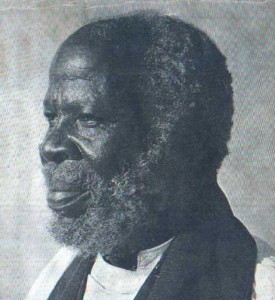By Yossa Way —

He was a Muslim soldier who fought against Christians until a Scripture verse stopped him in his tracks and set him on a new path in life.
Waswa Munubi grew up in Uganda. During his youth, he was an avid marijuana smoker. In military service, he fought against Christians until he came under the influence of Alexander Mackay, a Scottish missionary with the Church Missionary Society. Challenged to read the New Testament, one verse in the Sermon on the Mount grabbed his heart in an unexpected way.
“You are the salt of the earth. But if the salt loses its saltiness, how can it be made salty again? It is no longer good for anything, except to be thrown out and trampled underfoot. (Matthew 5:13)
After he read that passage, Munubi surrendered his life to Jesus Christ and was born again. At his baptism, he took the name “Apolo,” after the eloquent Alexandrian Jewish believer who “was fervent in spirit, spoke and taught accurately the things concerning Jesus” (Acts 18:25).
Apolo left military service and began his discipleship training under the Anglican Church. He almost married, but his fiancée died unexpectedly before their wedding. After her death, Apolo decided to take the Apostle Paul’s advice in 1 Cor. 7:32, so he stayed single, and committed himself to serve the Lord wholeheartedly and completely.
He was the first to volunteer as a missionary to the neighboring region of Toro. After that, he was sent to Boga, in the Democratic Republic of the Congo.
To get to Boga, Apolo walked over the Rwenzori Mountains, then he traveled another 50 miles through the forest. He only took his Bible and his hoe on the arduous journey. The Bible fed him spiritually; the hoe allowed him to find work along the way.
When he arrived at Boga, Apolo began to boldly proclaim the gospel. However, many were offended by his preaching, because he spoke against traditional practices and behavior, such as sorcery, polygamy, and drunkenness. He even offended Chief Tabaro, who gave the order that no one should give Apolo any food, in the hope that Apolo would die of hunger or leave his village.
Undeterred, Apolo remained steadfast and loyal to the Lord’s calling on his life and continued his ministry. Against all odds, he watched in amazement as the Lord provided for all of his needs.
Then a strange incident happened. Chief Tabaro’s sister died by accidently falling onto a spear that was carelessly left in the tall grasses at a building site. Apolo was blamed for her death, imprisoned and beaten, then sent back to Uganda where he was placed on trial for murder.
One night in the prison, Apolo had a life-changing dream. “I saw Jesus shining like the sun, He said to me, ‘Take heart, for I am with you,’” Apolo recalled later.
At the same time he had this powerful dream, God miraculously changed Chief Tabaro’s heart. Inexplicably, the chief requested that Apolo be released from prison and returned to his village. Through Apolo’s influence, the chief became a believer himself and the two men became close friends.
After these dramatic events, Apolo’s heart was revived and encouraged. Full of the Holy Spirit, he began to preach with even greater boldness. Wherever he spoke, people gave up their old customs, repented, and began to follow Jesus.
Apolo declared the year 1921 as “the year of the Gospel.” God began to touch his heart about reaching the pygmy tribes who inhabited forested areas in the Democratic Republic of the Congo.
Faithful to God’s call, he went to live among the Walese, Wanyali, and Wambuti as a friend. When he preached, he often told them about another unusual encounter with Jesus: “Christ appeared before me as a man. It was like seeing a man who was my brother. He said to me, ‘Go, preach in the forest, because I am with you. I Am who I Am–this is my Name.'”
Due to the Lord’s favor and an anointing propelled by the Spirit, Apolo became known as “the Apostle to the Pygmies” for his work among the Bambuti people of the Ituri forest in the eastern part of the country.
He died in 1933 at Boga, his mission field. Contrary to local customs, he was buried with his head toward the west (not the east) at his request. This signaled his desire that the Gospel should go to the western part of the country. Others, inspired by his example, continued his work throughout the Democratic Republic of the Congo.
This article, edited and adapted by permission of the Dictionary of African Christian Biography, was originally researched and written by Rev. Yossa Way, Project Luke Fellow and Professor of Theology at the Institut Supérieur Théologique Anglican in Bunia, Democratic Republic of the Congo. Chris Wilkinson assisted Mark Ellis in editing this article.
If you want to know Jesus personally, go here




I HAVE A NEW SPIRITUAL HERO……………THANK YOU SO MUCH……….THIS HAS NOURISHED MY HEART GREATLY…..I WANT TO BE ABLE TO READ MORE…………HOW CAN I FIND THE BOOK OR MORE INFORMATION……….? THANK YOU AND PLEASE DO MORE OF SUCH STORIES…………….
On the right side of the God Reports blog, there is a box titled “Categories.” Under categories, click on “testimonies.” We currently have 53 on God Reports. I know you will be inspired by many of these. Blessings!
Can you put me on your new letter please I want to have this kind of testimony direct to my email so i can share it with people.I can’t praise the lord enough for his great love for all kind of people His love has always amaze me I fell in love with Him 33yrs ago and I love Him more than ever today that what I call True Conversion….
Hope hear from you soon love and blessing Martina
Comments are closed.